Story highlights
Hesham Modamani and Feras Abukhalil met for the first time a day before their swim
Traveling via Jordan to Turkey, neither could afford the cost of going on to Greece
They decided that swimming 8 kilometers was their only option
Hesham Modamani looked out at the sea separating him and his dream of getting to Europe, the continent that could finally free him from the horrors back at home in Syria. The 24-year old felt nervous.
Modamani couldn’t afford to pay the $1,350 ticket for a smuggler to ferry him across the channel between the coast of Turkey and the nearest Greek island.
Swimming, he decided, was his best chance. The one-time college student had traveled all the way from the Damascus suburb of Daraya to Turkey’s west coast. He couldn’t give up now.
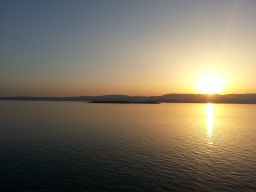
Modamani turned to his new friend and accomplice Feras Abukhalil, a fellow Syrian. They strapped on their blue life vests and packed away their passports and cell phones in waterproof bags.
Then they jumped.
Immediately Modamani felt cold and afraid in the dark waters of the Aegean Sea. “This was the scariest moment of my life,” he told CNN.
Epic swim
Abukhalil had spent two months meticulously plotting and researching the journey using Google maps.
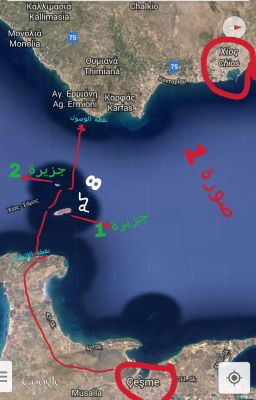
They would begin their epic swim from the most protruding point in the Turkish coastal city of Cesma, roughly 8 kilometers (5 miles) away from the Greek island of Chios. The map showed two tiny landmasses in the water that could be resting points for the pair along the way.
READ: $1,350, but destroy the boat
When Modamani met Abukhalil for the first time a day earlier, he was surprised to hear himself asking to join in on this stranger’s plan. The two had met at Amman airport in neighboring Jordan – their documents would get them as far as Turkey.
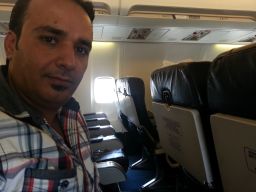
“I thought it (the plan) was a joke at first,” Modamani said. “But when I looked at it, I felt I could do this.”
The reality was much different.
“As soon as Hesham got in the water he became afraid,” Abukhalil said of his younger compatriot. “I encouraged him a lot and pushed him to swim just a few meters with me and see how he felt.”
The two started swimming and as they became comfortable in the water, the first leg of the journey became easier and more enjoyable.
“At this moment I looked up and saw a black sky full of stars, and I told Feras this is the most beautiful scene I have ever seen in the world,” Modamani said, “that we must be of the very rare few to live this experience.”
‘Vultures’ in the sky
By the time the two approached the first planned resting point, the initial excitement had dissipated. They had been swimming for nearly two hours in the pitch black night to avoid detection by the Turkish coast guard.
“As we got closer to the first island, I heard birds circling. I thought they were vultures looking for bodies to eat,” Modamani said.
The pair had planned to stop, rest and eat the chocolate bars they had packed in nylon sacks for energy – but as they approached the rocky islet, it was clear this was not an option. They floated for a moment, then decided to continue on to the second spot they had seen on their map.
READ: Joining the refugee exodus
A kilometer later they arrived at the second islet, but it was even rockier and higher than the first – and impossible to climb.
“I started praying ‘Oh God, give me patience,‘“Abukhalil recalled. “There was no time to think, there was nothing to feel, we had to keep going.”
The two agreed to swim slowly to conserve energy and, perhaps, most importantly, make light of the situation.
Pain and exhaustion
“I would pull his arm forward and just start making jokes in the water,” Abukhalil said with a chuckle. “When you are in pain the only thing you can do is laugh.”
As their exhaustion grew, the coastline of Chios appeared closer and clearer. But after swimming for nearly five hours. Modamani could carry on no longer. Abukhalil estimated they were now in Greek waters, and agreed to call for help.
Modamani unwrapped the cheap green laser pen he had purchased in Turkey and started beaming it around, but it quickly got wet and switched off.
It was enough.
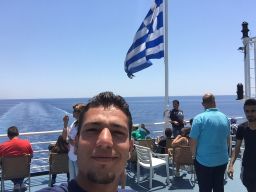
A ship saw the flash and sailed closer to the two. The captain of the tourist boat began circling the swimmers, until the Greek coast guard arrived and pulled the men out of the water. They were just one kilometer from shore.
CNN cannot independently verify the men’s story, but maps of the area do show the route as described in their extraordinary tale. A Greek Coast Guard officer also said she remembered a similar case involving two men swimming to the shores of the island.
“We rescued two men off the coast of the island who said they had swam,” Despina Pirianian, an officer and Commander of Security told CNN. “We didn’t press them without reason because our duty is to respect their humanity first and the law second.”
READ: Which countries welcome refugees?
The two men spotted by Pirianian “in the middle of the summer” apparently arrived alone – an unusual occurrence, given that most of the 300,000-plus refugees who have arrived in Greece this year traveled there in overcrowded boats.
Pirianian had no recorded names for the two men she described, but said their remarkable story and haggard appearance stood out to her among the thousands of desperate people she has received in recent weeks.
Reaching Europe
Abukhalil was born in the port city of Lattakia, the stronghold of Syrian President Bashar al-Assad and much of the Alawite minority from which he hails.
The 37-year old spent his childhood swimming in the Mediterranean. Little did he know that he would have to one day swim across it to save his life.
When the Syrian uprising began in 2011, Abukhalil began to fear for his safety, and for the future of his two young sons. Every day it seemed people were being snatched off the street by secret police, some for their involvement in anti-government activities, others for avoiding military recruitment.
“Those who are taken to jail might as well be dead,” Abukhalil said. “They disappear forever and their families are left without anything.”
The former computer engineer fled with his family to Jordan, only to find that he had traded relative safety for total financial instability. He couldn’t find a steady job and struggled to enroll his children in school.
“Necessity is the mother of invention,” Abukhalil explained. “So I started to use my technology skills to study the closest point in Turkey to Greece, what currents were most favorable, the best travel routes.”
Abukhalil had $2,000 to make it all the way to Brussels, where his mother and brother lived and could offer him support. His plan was to fly to Turkey, swim to Greece, then trek through Europe on buses, trains and by foot.
READ: Amanpour: We can all afford to be human
Abukhalil said that his sons, aged 7 and 5, were too young to understand the risks of the 20-day voyage their father was about to undertake. Instead they shouted, “Daddy is a swimmer! Daddy is a swimmer!”
By the time Abukhalil reached the shores of Greece he “felt that 90% of my journey was complete. I felt there was nothing but a bit of walking left after this and I will be at my destination.”
Perilous land journey
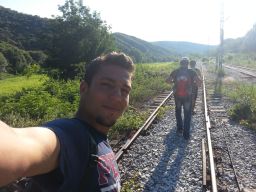
Abukhalil declined to share many details about the next leg of his trip – a perilous land journey across eastern Europe – either out of stubbornness or humility. But Modamani told CNN that his friend used his GPS to lead a group of 200 men, women and children through the forests of Macedonia.
The two men eventually separated. Modamani is now in Lübeck, learning German and waiting for his asylum papers to process with the government. Abukhalil lives in an unofficial refugee camp in Brussels as he too waits for his residency to be approved. He longs for his family but knows it may be some time before he can see them again.
Both said jumping into the cold sea that June night was a necessity, not a choice. They said they would never advise other refugees to do the same, but for them it seemed like the only option at the time.
Modamani plans to finish his degree and says he would like to one day work for an international aid organization or the United Nations.
“I saw oppression inside Syria,” Modamani said. “But I also saw oppression against Syrians outside of Syria.
“I don’t want anyone to suffer like I did again. I want to be able to stand up for people’s human rights.”


